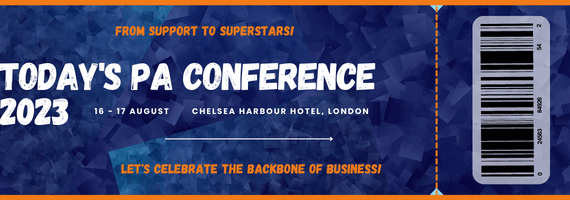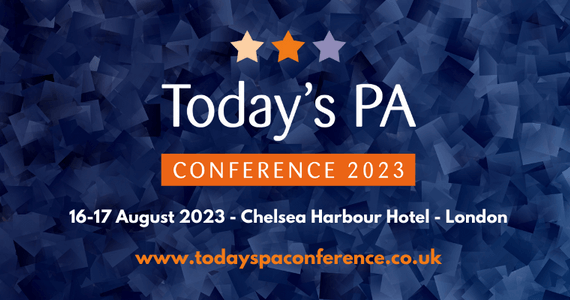Shopping cart
Your cart is empty
£0.00

For many of us, PAul Pennant will need no introduction. As MD and Principal Trainer of Today’s PA, he has trained thousands of office professionals all over the world. Having been a PA and Office Manager himself, he understands only too well the pressures of today’s business environment. At Today’s PA Conference, PAul was discussing one of the biggest hurdles facing PAs: handling the constant requests for help.
It’s something we all deal with on a daily basis and it’s a very emotive subject. We feel we’re being a team player but soon discover that we’re helping everyone else in the office – to the detriment of our own work. Turning down such requests leaves us feeling guilty, can lead to awkward situations and cause friction in the office. But as PAul points out, this is why we need to define our role, assess our priorities, and make sure we have plans in place to deal with competing deadlines. Here, he explains why we fall into the trap of saying ‘yes’, and shares some of his guilt-free strategies for saying ‘no’.

“The truth is that most PAs want to be liked by the people around them; their colleagues, their peers, and other managers and directors within the organisation. The easiest way to get people to like you is to say ‘yes’ to everything.
At first, it’s not a problem. But if you’re always agreeing to help, and it’s becoming a daily occurrence, you’ll find that more and more people start asking you to do things. Having once said ‘yes’, it’s hard to say ‘no’.
You then discover that you no longer have enough hours in the day to get all the work done. So what happens? You come in an hour early, miss lunch, miss tea breaks, and leave late. And still you can’t get all the work done. You find yourself on a treadmill that you can’t get off because you’re still saying ‘yes’ to everybody. What starts out as you helping a colleague can actually create more problems further down the line, as now everyone knows that you’re willing to step in. Colleagues start to taking more risks, not planning their work properly and leaving things until the last minute because they know you’re always able to help. The treadmill just goes on and on.
It’s a situation that can escalate quickly and become completely out of control. I’ve trained PAs who are working 14 or 15 hour days and still can’t catch up. Others continue working while on sick leave or annual leave, just to keep on top of their work. I’ve even trained PAs who have felt guilty going to the bathroom. It can become very extreme very quickly.”
“You need to understand that there will always be a queue of people asking you for help. You can’t say ‘yes’ to everyone, so you need to define your role, and look at what it is and what it is not. It is not the role of a PA to say ‘yes’ to everybody. It is the role of a PA to assist their manager or managers meet their strategic objectives. Remember that you’re not saying ‘no’ to be difficult. You have to say ‘no’ in order to do your job effectively.”
“You can’t. Because just saying ‘no’ to some people will always cause offence. What often happens is that people get offended, and you feel guilty – so you end up saying ‘yes’. You can’t let your first ‘no’ depend on how people react. It needs to be based on something stronger than that, which is helping your boss (or bosses) meet their objectives.
Realise that it’s impossible to say ‘yes’ to everybody. If you do, then you’re going to be saying ‘no’ to time with your family, your friends, and you could be saying ‘no’ to your health, too. Something is going to suffer eventually.”
“The direct approach might be quite difficult. If you feel a little anxious about it, you can try saying, “I can’t be sure until I check with my manager. I’ll come back to you”. It’s a way of saying ‘no’ without saying ‘no’. But sometimes you need the ‘no’ to be simply “no, I can’t help you with this”.
And don’t always offer a solution. You may not end up doing the work yourself but you’ll spend time looking for someone who can. This isn’t always the right approach. It can be just as bad as saying ‘yes’ all the time. By offering a solution each time, you’re creating the same kind of treadmill for yourself, which is everyone expecting you to solve their problems for them.
So sometimes you need a ‘no’ without either an explanation or a solution. That can be difficult for us as PAs.”
“If you have more than one manager, certainly if you work with multiple managers, the solution is not to go into work early and leave late to try to keep everyone happy. The ideal way around this is to meet your managers individually and agree a strategy. You may even want to have a meeting with all of your managers to see how best they can use you as a resource. Your time is finite and needs to be used in the most effective way possible. Decide how you are all going to work, agree the methodology, and know where you stand. It should make your life a lot easier.”
“No, it’s right across the board. All industries are now under pressure, having to get by with fewer resources. You have to work smarter and make sure you’re doing your job effectively. There is no way you can do everything that everyone wants all the time, but you still need to be able to help out in an emergency. However, an emergency is something that occurs perhaps twice a year, not every week. If emergencies are happening on a regular basis, that’s a problem with planning, not a real emergency situation.”
“Begin by defining exactly what your role is. Once you’ve done that, you can start to get comfortable with the fact that one or two people may not like you. If you can get used to the idea that work isn’t a popularity contest, your role will becomes easier!
You can practice saying ‘no’, if you think it’s too difficult. Try it out in smaller situations, say, at home with friends and family. Once you get used to it, it will be easier in more formal situations.
For instance, if you’re in a restaurant and they ask if you would like a particular table, say no, you’d prefer another table nearer the window. Do the same in the cinema. When they offer you certain seats that you feel are too near the screen, say no, you’d like seats further back.”
“One is to say, “I’ll need to ask my manager”. That’s a good way of saying ‘no’ without saying ‘no’. That’s a definite skill!
Another is to ask for time. You can say, “I can’t make a decision on this right now.” It’s not exactly saying ‘no’ and it gives you some breathing space.
However, I think the most important thing is to define your role. It may be that your role is indeed to help everybody. But if your role is to support your manager(s) then that is your priority and you should spend the majority of your time doing exactly that.”
“Everyone is working longer hours. Mobile devices mean you can plan your day, and organise diaries and To Do lists during your commute. This certainly makes the best use of your time, but be aware that it still means you’re working extra hours.
And speaking of mobile devices, think hard about whether you need a mobile phone purely for work. If your job means you do, agree the parameters first. Do you get paid more? When can you turn it off? Do you need to leave it switched on all the time, meaning that potentially you could be working 24 hours a day? It’s all too easy to fall into that trap.
Finally, find a way of looking after yourself. No matter how good they are, organisations, generally speaking, aren’t there to look after you. So come in on time, not an hour early, and make sure you leave on time, or as close as possible. It depends on the nature of the job, but your finishing time should be proportionate to your role.
Take the time to have your full lunch hour, and get away from your desk. Go and read your book in the café, take a stroll to the park or even just around the block, anything to give yourself that time away from your from your desk and your computer screen. If you work through lunch or miss your breaks, you’ll feel tired and stressed and be much less efficient. Start taking care of yourself at work – no one else will.”



Tel.: +44 (0)20 7622 2400
Email: info@todayspa.co.uk
Today's PA
52 The Warwick Building
Chelsea Bridge Wharf
366 Queenstown Road
London
SW11 8NJ
Copyright © 2024 Today's PA. All rights Reserved.
We use cookies, just to track visits to our website, we store no personal details.
ACCEPT COOKIES What are cookies?